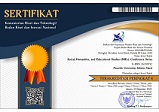Improving the Quality of Primary School Education with Hybrid Learning
Abstract
Hybrid learning in elementary schools has become an important topic in facing the educational revolution and technological advances. The aim of this research is to illustrate the urgency and benefits of hybrid learning, an approach that integrates online and face-to-face learning. Against the backdrop of dynamic changes in the world of education and technological developments, hybrid learning in elementary schools is a relevant solution to prepare students to face future demands. The hybrid learning concept not only involves developing digital skills through digital literacy from an early age, but also provides flexibility in time and place, overcomes barriers to students' physical presence, and strengthens the development of social and interpersonal skills through direct interaction in the classroom. Although faced with implementation challenges, such as limited technological infrastructure and teacher training needs. By considering the results of case studies regarding the successful implementation of hybrid learning, it is concluded that this learning provides a strong foundation for providing holistic and relevant education at the elementary level, preparing the younger generation to face global change with comprehensive readiness and skills.
Keywords
Full Text:
PDFRefbacks
- There are currently no refbacks.





